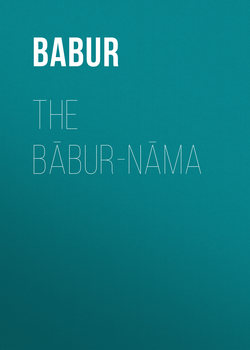Читать книгу The Bābur-nāma - Babur - Страница 14
PREFACE
Chapter III.
THE TURKI MSS. AND WORK CONNECTING WITH THEM
Part II. Work on the Hindustan MSS
VII
ОглавлениеThe later Waqi’at-i-baburi translated by ‘Abdu’r-rahim Mirza is one of the most important items in Baburiana, both by its special characteristics as the work of a Turkman and not of a Persian, and by the great service it has done. Its origin is well-known; it was made at Akbar’s order to help Abu’l-faẓl in the Akbar-nāma account of Babur and also to facilitate perusal of the Babur-nama in Hindustan. It was presented to Akbar, by its translator who had come up from Gujrat, in the last week of November, 1589, on an occasion and at a place of admirable fitness. For Akbar had gone to Kabul to visit Babur’s tomb, and was halting on his return journey at Barik-ab where Babur had halted on his march down to Hindustan in the year of victory 1525, at no great distance from “Babur Padshah’s Stone-heap”. Abu’l-faẓl’s account of the presentation will rest on ‘Abdu’r-rahim’s information (A.N. trs. cap. ci). The diction of this translation is noticeable; it gave much trouble to Erskine who thus writes of it (Memoirs Preface, lx), “Though simple and precise, a close adherence to the idioms and forms of expression of the Turki original joined to a want of distinctness in the use of the relatives, often renders the meaning extremely obscure, and makes it difficult to discover the connexion of the different members of the sentence.14 The style is frequently not Persian… Many of the Turki words are untranslated.”
Difficult as these characteristics made Erskine’s interpretation, it appears to me likely that they indirectly were useful to him by restraining his diction to some extent in their Turki fettering. – This Turki fettering has another aspect, apart from Erskine’s difficulties, viz. it would greatly facilitate re-translation into Turki, such as has been effected, I think, in the Farghana section of the Bukhara compilation.15
14
Here speaks the man reared in touch with European classics; (pure) Turki though it uses no relatives (Radloff) is lucid. Cf. Cap. IV The Memoirs of Babur.
15
For analysis of a retranslated passage see JRAS. 1908, p. 85.
